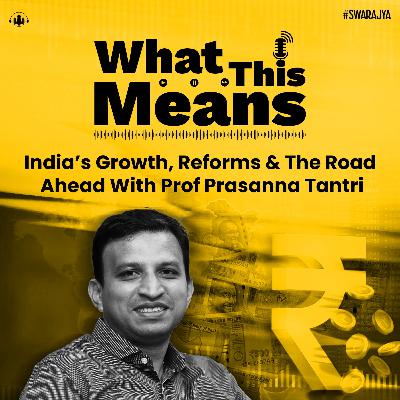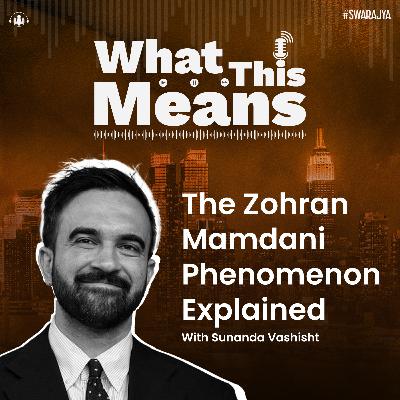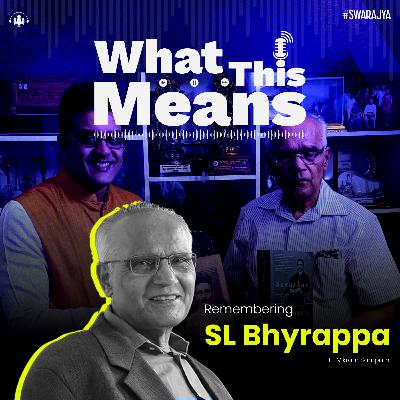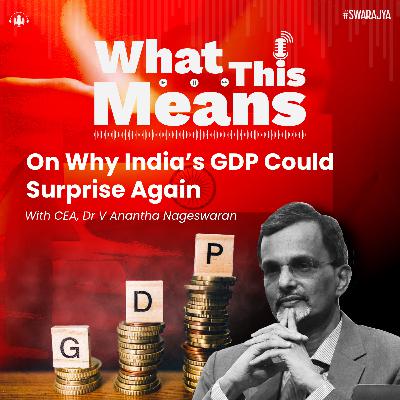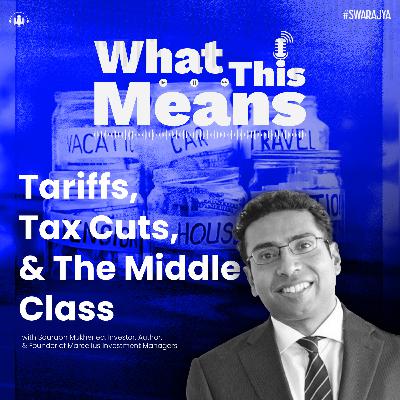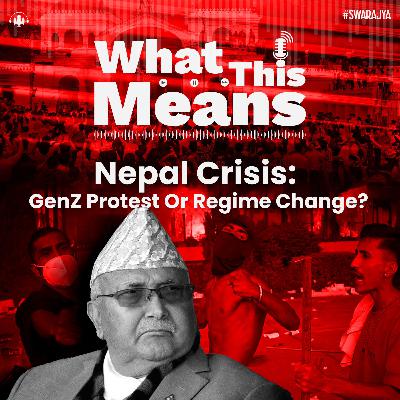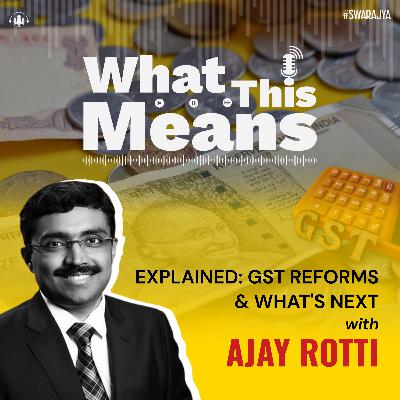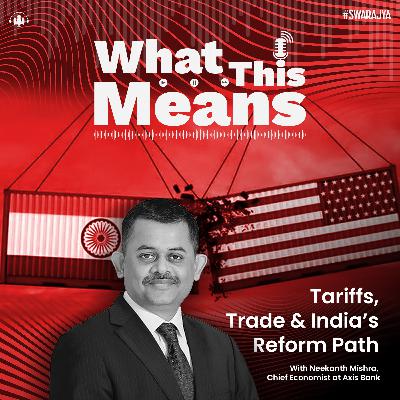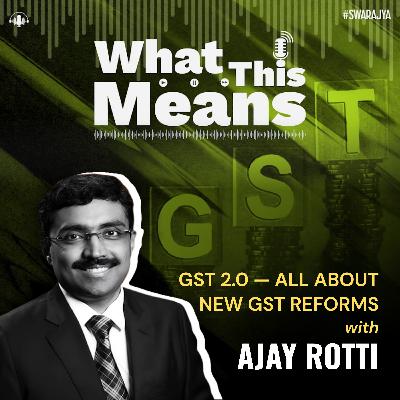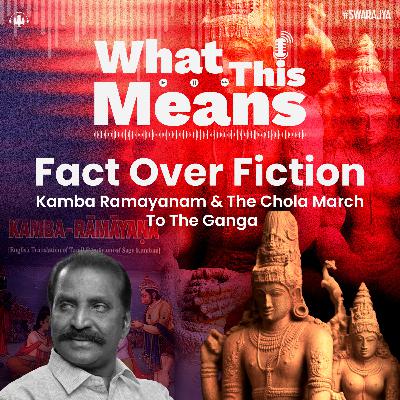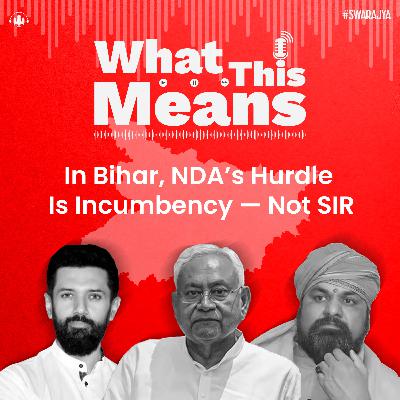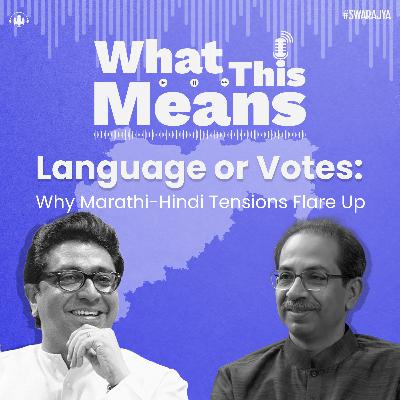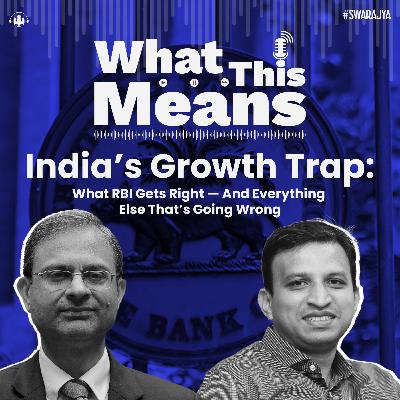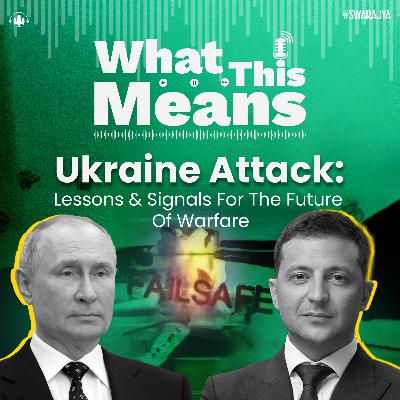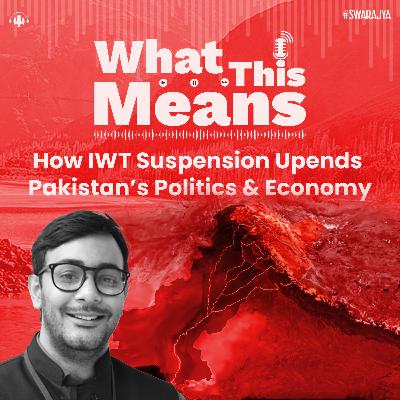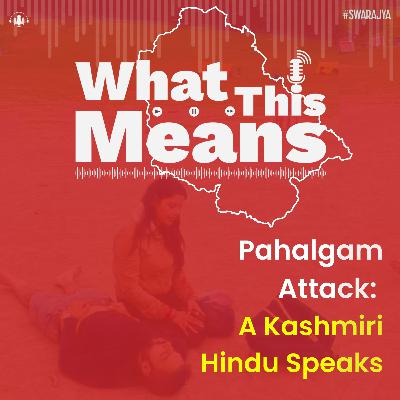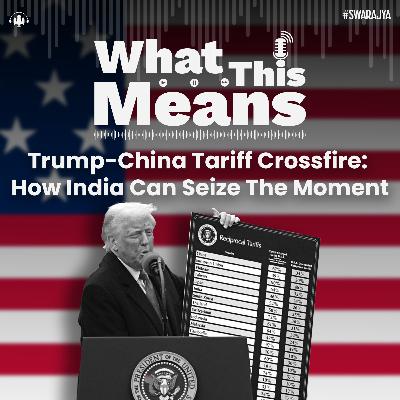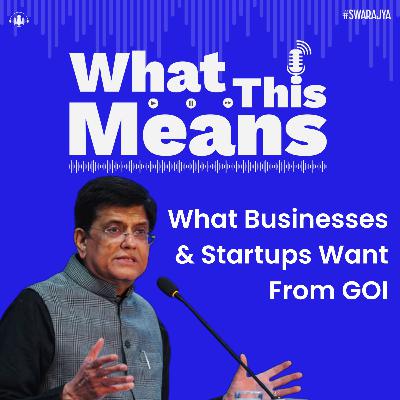Discover What This Means
What This Means

What This Means
Author: Swarajya
Subscribed: 4Played: 11Subscribe
Share
© Swarajya
Description
Swarajya explains the meaning of news and its effects. Hosted by Diksha Yadav.
You’ll love Swarajya’s new podcast, “What We Said”!
Tune in here: https://open.spotify.com/show/74mPYhyZSnCTo1GNktljV3?si=15ba0d8e071a4ef6
If you enjoy the show, don’t forget to follow and rate us!
You’ll love Swarajya’s new podcast, “What We Said”!
Tune in here: https://open.spotify.com/show/74mPYhyZSnCTo1GNktljV3?si=15ba0d8e071a4ef6
If you enjoy the show, don’t forget to follow and rate us!
113 Episodes
Reverse
"The three tax cuts have been very clean. The corporate tax cut, along with the individual tax cut and GST reforms, has been substantial enough to make a real difference... I believe this will spur growth, and that’s why I remain very optimistic."Prof Prasanna Tantri, in this episode of What This Means with Diksha Yadav, shares his takeaways on Q1 GDP numbers, GST reforms, and other reforms. He said, one thing the government should focus on more than "Build in India" is to "Innovate in India." And bring back innovators living abroad who are frustrated with what’s happening in the US and Australia and want to return. Create campuses where they can stay and work. They will be the job creators, and that will be a game changer.
"Zohran Mamdani has claimed every identity, whatever little bit he could claim – African, South Asian, Muslim – but he has not claimed what his genetic makeup of 50% actually is, which is Hindu."Political commentator and columnist Sunanda Vashisht joins us to discuss:-Why everyone's discussing Zohran Mamdani-What's behind his hate for the BJP & PM Modi-The centre void: With far-right and far-left winning elections-How important a person does Mamdani become if he is elected the mayor of NYC-Zohran's campaign and his policy proposals and more
The good and the bad of RBI's recent banking and capital reforms with Dr Prasanna Tantri.Prof Tantri is an Associate Professor of Finance and Executive Director at the Centre for Analytical Finance at the Indian School of Business.
"In 18 years I couldn’t manage to do it, but Dr Bhyrappa did in one — he got four of my books translated into Kannada within a year.”Dr Vikram Sampath joins us to discuss the life and works of legendary author Dr Santeshivara Lingannaiah Bhyrappa, who departed the mortal realm on 24 September 2025. This episode was recorded on 25 September 2025.
India's Chief Economic Advisor, Dr V Anantha Nageswaran speaks with us on the possibility of the country entering a higher GDP growth orbit; why India's economic data is not biased; why policy-makers ought to consider the dangers social media poses for youth, and much more.Read: https://swarajyamag.com/economy/interview-possible-that-successive-gdp-numbers-continue-to-surprise-on-positive-side-says-chief-economic-advisor-dr-v-anantha-nageswaran
Saurabh Mukherjea, investor, author & founder & CIO of Marcellus Investment Managers, joins us in the latest episode of What This Means.In this episode we discuss:-tax cuts, GST reforms, US tariffs, -the reason behind Indian market resilience in times of uncertainties, -the challenges facing the middle class, -the decline of white-collar jobs, -the rise of gig jobs, -saving tips in current times and more!
'There is a stench of a regime change operation here. There are three names which are coming up, who are being projected as perhaps heading the interim government now. 'Jaideep Mazumdar join us on Nepal Crisis to discuss:-The reasons behind protest, when did it all began-Why it's being called as GenZ protest-What next for Nepal, who will take charge-Who benefits the most from regime change-Has the Nepali communist movement weakened in the last 48 hours? -Did the pro-monarchy groups have a role to play in this? -What role can India now play in Nepal to bring stability?
"The GST has moved from a politically negotiated framework to one driven by economics and rationale. The earlier four slabs were transitional, not permanent, and I’m glad we have corrected that." Tax expert and founder and CEO of Tax Compaas, Ajay Rotti, joins us to discuss GST reforms and what more needs to be done on GST.
Neelkanth Mishra, Chief Economist at Axis Bank, Head of Global Research at Axis Capital and member of the Prime Minister's Economic Advisory Council, decodes the Trump administration's tariff policies and their implications for India. (Recorded on 25 August 2025)In this episode:- Impact of Trump's tariffs on Indian and average Indians- The Smoot-Hawley tariffs of the past- The transshipment game- GST 2.0 reforms- Strategic reform recommendations: Housing, deregulation, structural reforms- India's job challenge
Tax expert and founder and CEO of Tax Compaas, Ajay Rotti, helps us decode 3 things: problems that the existing GST solved, problems that the GST reforms will solve, and the problems that will still remain, in this episode of What This Means with Diksha Yadav.-Why GST Was Brought In -How GST Changed Indian Taxation-What GST Fixed And What It Didn't-What GST 2.0 Is Trying To Fix-The Two-Slab Reform: What It Means-GST Reforms — Challenges That Still Remain-What More Needs To Be Done Apart From GST
TS Krishnan, writer, historian and author, debunks the false Dravidian narratives on the latest episode of What This Means with Diksha Yadav.In this episode:📜 Vairamuthu’s Claim on Kamban & Shri Ram — Fact vs. Misinterpretation🗡 Vali Vadha in Valmiki & Kamban🏰 Rajendra Chola’s Northern Expedition — Sanctifying Capital, Not Expanding Empire⚖ Ethics of Dharmic Kings in War vs. Foreign Invaders📚 Where Beginners Should Start with Kambaramayanam
'In terms of narrative games, BJP is on the back foot in Bihar—not because of SIR, but due to anti-incumbency heat.However, the Opposition’s credibility in systemic issues is so low, they can’t effectively question the incumbent.' says Adarsh Pandit on What This Means with Diksha Yadav.'In Bihar, BJP’s main bug right now is that they have the message and the machine, but no messenger.We discuss all that's happening in Bihar over SIR, and what various politcal parties are up to ahead of the state elections.
"Maharashtra has never had a pan-state Marathi Asmita like Tamil Nadu’s Tamil identity. Here, your regional identity and caste identity precede your linguistic identity.""Maharashtra has always looked towards Delhi. From Shivaji to the Peshwas, the ambition was national, not regional — which is why linguistic chauvinism has never found a full home here." -Can BMC Elections be won on linguistic grounds?-Who really benefits if the Thackeray brothers join hands for the municipal elections?-Challenges for the BJP in the BMC elections-Is Marathi linguistic chauvinism similar to that of Tamil or Kannadiga linguistic chauvinism?-And more!
"India’s biggest reform, in my opinion, was the Jan Dhan Yojana (PMJDY) — and it was also the cheapest. Reform isn’t about spending more.""Though late, the RBI has now done everything it could on the monetary policy front to boost growth.""In my view, GDP growth for the current fiscal year will exceed 6.5%, but that’s still not something we should be satisfied with," says Professor Prasanna Tantri on What This Means with Diksha.On what’s going wrong, we discuss:— The three reforms needed to achieve 9% GDP growth— The many challenges around access to credit and the state of fintech firms— Problems with the GST: What was promised vs what we got— The urgent need to improve the ease of doing business— The low savings rate and its impact on investment— The rise in cash-to-GDP ratio, even amid booming digital transactions
“The moment Western funding and arms and ammunition stop flowing into Ukraine, the war is over,” says Sudharshan Garg.In this episode, we discuss:— Takeaways from Ukraine's Operation Spider Web— Is the future of warfare now drone-driven?— Is internal security as important as border security in modern warfare?— As much as Trump has been taking credit for peace and warning both Russia and Ukraine, is either of them actually listening to him?— Will the Ukraine-Russia war now expand to Europe as well? — Where does all of this fit into the nuclear doctrine of Russia?
This is all you need to know about the Indus Water Treaty suspension!Rohit Pathania, in this episode with Diksha Yadav, explains (Recorded on 28 April 2025):- Why was the decision for IWT abeyance not taken earlier when heinous attacks happened?- How long can the IWT suspension last?- How IWT abeyance by India impacts Pakistan's economy and politics- How does it benefit India?- Can Pakistan halt the hydropower projects in J&K in the future?- Off the topic: What to make of the Pak's propaganda and the memes online- What China can and cannot do to help Pakistan- After IWT abeyance, what's the next damage that can be inflicted in the immediate term?
"I'm not impressed with your (locals) candle marches. I am not impressed with you going on television and saying that we are sorry. I am not impressed with all those. We don't need your apologies."Do you, in your dealings, say that 'this is it; enough is enough,' do you tell them (terrorists) 'you do not get support from us,' like locals said to the terrorist Khalistanis in Punjab back in the 1980s & '90s?"You go on TV, you do candle marches because you are worried now. All that is because they (locals) now know that a lot of people are going to be picked up for interrogation. They're worried about what they call crackdowns now," says Sunanda Vashishtha on 𝗪𝗵𝗮𝘁 𝗧𝗵𝗶𝘀 𝗠𝗲𝗮𝗻𝘀 with Diksha Yadav.
Ajay Srivastava is a former Indian Trade Service officer with expertise in trade policy making and WTO/FTA negotiations. He is also the founder of the Global Trade Research Initiative (GTRI).In this episode of What This Means, we discuss:— Where is the US-China tariff war headed, and who will suffer more?— Why is Trump pursuing this strategy? Will the US lose geopolitical trust and long-term trade integration?— What are the short- to medium-term impacts on India? What should India’s stance be on China?— What India needs to do to increase its favourable outcomes and make the most of the situation.
Swarajya's Jaideep Mazumdar explains:- Why Bengali Hindus vote for Mamata Banerjee and her party- Why 'intellectuals' of Bengal have been silent about the Murshidabad violence- The drawbacks of BJP in West Bengal- Whether a strong RSS presence in Bengal can help the BJP in the assembly elections
Deepak M Nadiger has been CEO of multiple pharma companies and is an active angel investor in startups in the manufacturing & aligned economy space.In this episode we discuss the various challenges businesses, startups and investors face and what they expect from the government.— The funding & high capital cost— The scaling challenge & bad infra— ‘Interpretation Raj’— compliance burden & vaguely worded regulations— Payment delays & MSME schemes— Can digitalisation of government processes and verifications help?— Quick e-commerce vs the Kirana stores


